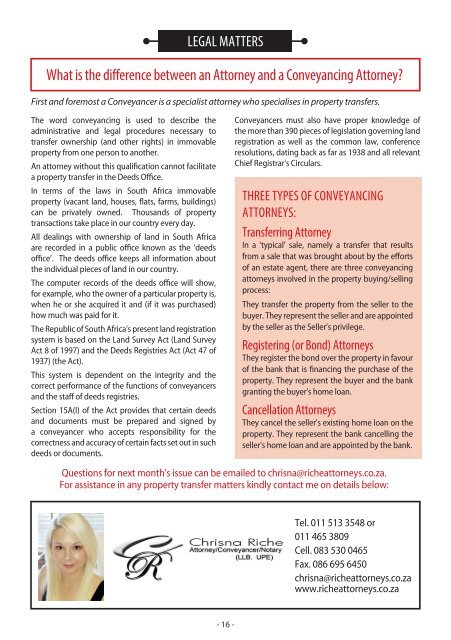Glen Publisher_Dainfern In Focus_Issue 0717
You also want an ePaper? Increase the reach of your titles
YUMPU automatically turns print PDFs into web optimized ePapers that Google loves.
LEGAL MATTERS<br />
What is the difference between an Attorney and a Conveyancing Attorney?<br />
First and foremost a Conveyancer is a specialist attorney who specialises in property transfers.<br />
The word conveyancing is used to describe the<br />
administrative and legal procedures necessary to<br />
transfer ownership (and other rights) in immovable<br />
property from one person to another.<br />
An attorney without this qualification cannot facilitate<br />
a property transfer in the Deeds Office.<br />
<strong>In</strong> terms of the laws in South Africa immovable<br />
property (vacant land, houses, flats, farms, buildings)<br />
can be privately owned. Thousands of property<br />
transactions take place in our country every day.<br />
All dealings with ownership of land in South Africa<br />
are recorded in a public office known as the ‘deeds<br />
office’. The deeds office keeps all information about<br />
the individual pieces of land in our country.<br />
The computer records of the deeds office will show,<br />
for example, who the owner of a particular property is,<br />
when he or she acquired it and (if it was purchased)<br />
how much was paid for it.<br />
The Republic of South Africa's present land registration<br />
system is based on the Land Survey Act (Land Survey<br />
Act 8 of 1997) and the Deeds Registries Act (Act 47 of<br />
1937) (the Act).<br />
This system is dependent on the integrity and the<br />
correct performance of the functions of conveyancers<br />
and the staff of deeds registries.<br />
Section 15A(I) of the Act provides that certain deeds<br />
and documents must be prepared and signed by<br />
a conveyancer who accepts responsibility for the<br />
correctness and accuracy of certain facts set out in such<br />
deeds or documents.<br />
Conveyancers must also have proper knowledge of<br />
the more than 390 pieces of legislation governing land<br />
registration as well as the common law, conference<br />
resolutions, dating back as far as 1938 and all relevant<br />
Chief Registrar's Circulars.<br />
THREE TYPES OF CONVEYANCING<br />
ATTORNEYS:<br />
Transferring Attorney<br />
<strong>In</strong> a ‘typical’ sale, namely a transfer that results<br />
from a sale that was brought about by the efforts<br />
of an estate agent, there are three conveyancing<br />
attorneys involved in the property buying/selling<br />
process:<br />
They transfer the property from the seller to the<br />
buyer. They represent the seller and are appointed<br />
by the seller as the Seller’s privilege.<br />
Registering (or Bond) Attorneys<br />
They register the bond over the property in favour<br />
of the bank that is financing the purchase of the<br />
property. They represent the buyer and the bank<br />
granting the buyer's home loan.<br />
Cancellation Attorneys<br />
They cancel the seller's existing home loan on the<br />
property. They represent the bank cancelling the<br />
seller's home loan and are appointed by the bank.<br />
Questions for next month's issue can be emailed to chrisna@richeattorneys.co.za.<br />
For assistance in any property transfer matters kindly contact me on details below:<br />
Tel. 011 513 3548 or<br />
011 465 3809<br />
Cell. 083 530 0465<br />
Fax. 086 695 6450<br />
chrisna@richeattorneys.co.za<br />
www.richeattorneys.co.za<br />
- 16 -





